Watermelon is a popular summer dessert. And, when you’re eating something you enjoy (for example, a tasty apple), it’s tempting to share it with your dog. But, of course, who can say no when your dog has those beseeching puppy dog eyes?
When it comes to dogs eating watermelon, remember which fruit sections are suitable for them to eat and how much they can consume at once. So, can dogs consume watermelon? This and other questions will be addressed in the following article.
Do you have a specific question about dogs eating watermelons? Then use the table of contents below to jump to the most relevant section. And you can always go back by clicking on the black arrow in the right bottom corner of the page. Also, please note that some of the links in this article may be affiliate links. For more details, check the Disclosure section at the bottom of the page.
Here's what we'll cover:
- Is watermelon safe for dogs?
- Are dogs allergic to watermelon?
- Is watermelon bad for dogs?
- Is watermelon healthy for dogs?
- Can dogs eat watermelon rind?
- Are watermelon seeds bad for dogs?
- Can dogs with pancreatitis or diabetes eat watermelon?
- Can dogs have watermelon?
- How can dogs eat watermelon?
- Watermelon for Dogs: Final Thoughts
Is watermelon safe for dogs?

Yes, but only a tiny amount of the fruit should be shared with your dog. Like most human foods, watermelon should be consumed in moderation and with a certain care.
Smaller dogs should be given tiny amounts of fruit, while larger dogs can eat more and remain safe. Remember that treats are not a replacement for a properly balanced diet.
They should account for no more than 10% of the food your dog’s daily food consumption.
Are dogs allergic to watermelon?
Watermelon does not cause allergies in the majority of dogs. A dog can, however, suffer a watermelon allergy, which is uncommon. It’s also worth noting that dogs process food differently than humans. Therefore, excessive consumption of certain foods, especially watermelon, can result in digestive troubles and other health complications.
Is watermelon bad for dogs?
When ingested in moderation, watermelon is not harmful to dogs. However, only feed your dog actual, all-natural watermelon. Avoid anything processed or artificially flavored. These items are typically loaded with chemicals, sugar, and other components that are harmful to dogs.
Excess sugar consumption can cause severe stomach irritation in the near term and unhealthy weight gain in the long run. In addition, avoid anything that contains artificial sweeteners, such as xylitol, which can be extremely hazardous to dogs.
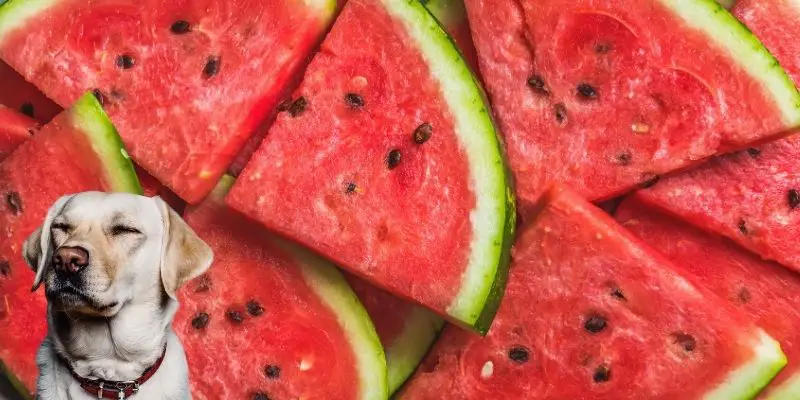
Watermelon and dogs make an excellent combination. However, I recommend cutting and prepping the watermelon yourself. That’s the only sure way to know what’s in it.
Is watermelon healthy for dogs?
Watermelon is full of nutrients. It can be healthy for your dog if consumed in moderation. One of the best aspects of watermelon for dogs is primarily water.
In fact, the meat is 90% water, making it a refreshing treat on a hot summer day.
This nutritious snack contains vitamins A, B6, and C, minerals calcium, iron, and potassium, in addition to water. Watermelon also contains lycopene and other antioxidants, which may aid in the prevention of cancer, and inflammation and maintain a healthy immune system. Watermelon may also assist in managing blood pressure, promoting muscular function, and preventing heart disease.
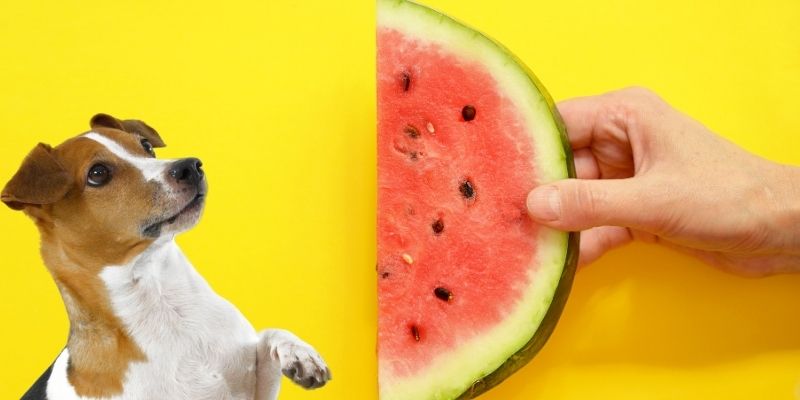
There’s even more excellent news! Watermelons are minimal in calories, salt, fat, and cholesterol. As a result, it is a healthier alternative to many store-bought dog treats. On hot days, it can also help kids stay hydrated.
Remember that dogs are mostly carnivores. Thus they have no need for fruits or vegetables in their diet. Although, of course, watermelon can be served as a treat on occasion. Still, high-quality animal protein should make up most of your dog’s diet.
Can dogs eat watermelon rind?
No, dogs should not eat the rind of a watermelon. While the flesh of watermelon might be safe and even beneficial to your dog, the rind can be hazardous. It might induce gastrointestinal problems, such as vomiting and diarrhea if consumed.
Watermelon rind is also incredibly tough to eat. Your dog may swallow the rind without chewing it, posing a choking hazard or causing an intestinal blockage. The skin is also difficult to digest, increasing the likelihood of obstruction.
Smaller dogs are more vulnerable to choking or obstruction than larger canines. Still, it’s better to avoid giving your dog watermelon rind. According to the American Kennel Club, most of us spend up to $1500 a year for standard veterinary care. You don’t want to add to your expenses by letting your dog eat something he shouldn’t.
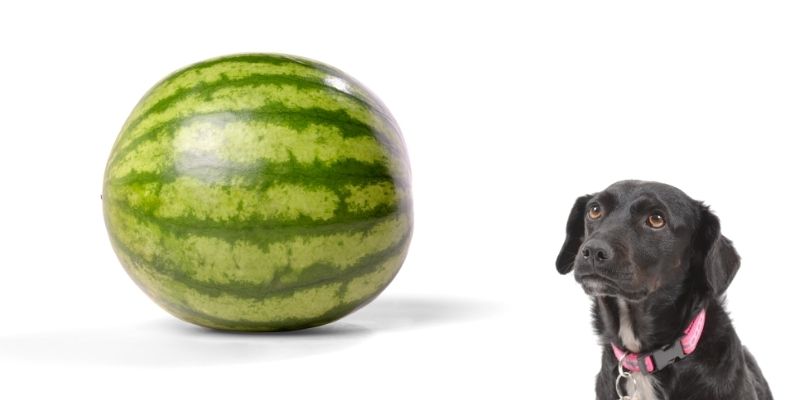
The rind might also be harmful to your dog’s teeth. Especially if your dog has any dental or gum issues. Biting onto it could give your pup great pain or break a tooth.
Are watermelon seeds bad for dogs?
Watermelon seeds are toxic to dogs. Although one or two seeds are unlikely to cause harm, consuming too many seeds at once could result in a possibly fatal blockage of the intestinal tract. Large dogs may pass the seeds without incident, but little dogs are more vulnerable.
Assume your dog swallows watermelon rinds or seeds by mistake. In that situation, you should keep an eye on the puppy for the next 24 hours. Take the dog to the emergency vet immediately if he exhibits bowel blockage symptoms such as constipation, lethargy, vomiting, or stomach pain.
Can dogs with pancreatitis or diabetes eat watermelon?
Because watermelon contains no fat, dogs with pancreatitis can occasionally enjoy it as a treat. In fact, it’s relatively gentle on the stomach. It delivers much-needed hydration and nutrients, which may aid in the healing and protection of the pancreas.
Watermelon should also be safe for diabetic dogs as long as it is only given as a treat on occasion. Watermelon’s natural sugars should not harm your dog in little doses because it is also high in fiber. Because the fiber slows the release of carbohydrates into the bloodstream, there is no chance of sugar spikes.
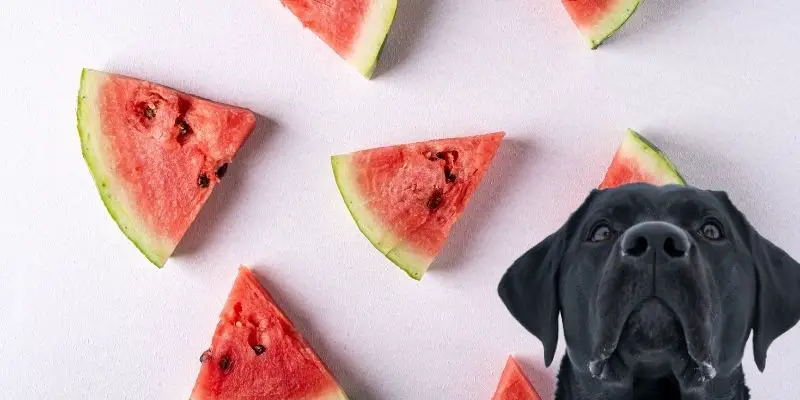
However, before modifying your dog’s food, contact your veterinarian, especially if he has an existing health concern.
Can dogs have watermelon?
Can dogs eat watermelon? If you enjoy watermelon and your dog does, you’re in luck. Watermelon can be consumed by dogs in moderation. So share your watermelon, but like with any other treat, proceed with caution. Remember that dogs can only eat the flesh of watermelons, never the rind or seeds.
Begin by giving your small dog amounts of watermelon at first to ensure your dog does not have an allergy. Dogs can also react differently to human diets. Due to the high fiber content of watermelon, dogs may get diarrhea when eating it. Mainly if they consume it all at once and aren’t used to it.
When you initially start giving your dog watermelon, watch him for the next few hours. Call your veterinarian if you see any stomach trouble or other worrying symptoms. Especially if they become severe or do not resolve within 12 hours.

How can dogs eat watermelon?
If you discover that your dog enjoys watermelon, simply serve it freshly sliced in little bits as a special treat. There are, however, several additional interesting methods to offer watermelon to your dog.
One method is to use a melon baller to scoop the watermelon flesh out of the skin or cut it into bite-size pieces. You may keep the pieces in the freezer for a healthy, frozen treat on the go as long as your dog doesn’t have any teeth or gum disorders that cause sensitivity to cold. Because frozen watermelon pieces have a softer texture, they should not shatter your dog’s teeth or provide a choking hazard like ice cubes.
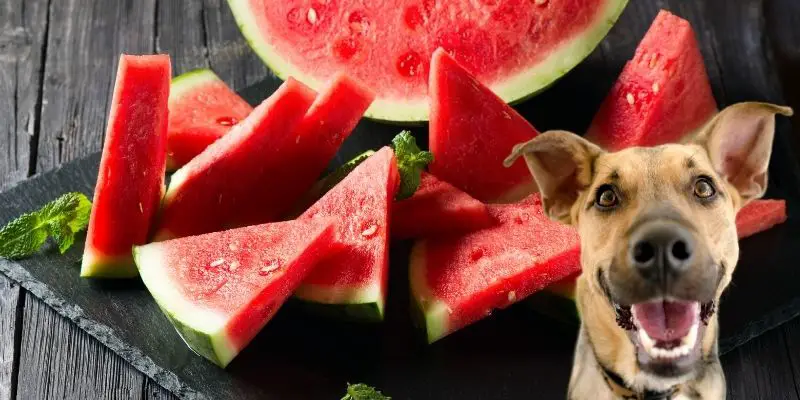
Another option is to freeze watermelon snacks. Simply combine chunks of watermelon flesh with coconut milk or yogurt and freeze in ice cube trays. When purchasing coconut milk or yogurt, choose unflavored, unsweetened kinds. These treats should be given in moderation if your dog is allergic to dairy. T after going on a walk on a scorching summer day.
If you want to try something different, you can convert a fresh watermelon into a chewy dessert. Simply cut the watermelon into strips or bite-sized chunks and dehydrate them in a food dehydrator or in a low-temperature oven. Although this alternative does not provide the hydration benefits of watermelon, most dogs like a crunchy treat every now and then.
Watermelon for Dogs: Final Thoughts
When given in little amounts, watermelon can be a healthy and delightful treat for your dog. In fact, it’s probably better for him than many store-bought sweets that are loaded with chemicals and preservatives. However, as with people, too many treats can be unhealthy, so make sure that most of your dog’s diet consists of nutritionally balanced dog food.
Thanks for the blog graphics: Canva.com

Thanks for the blog graphics: Canva.com
Doghint.com is a participant of several affiliate programs. The list includes (but not limited to) the following: VigLink, Refersion, ShareASale, and Amazon Services LLC Associates Program, an affiliate advertising program designed to provide a mean for us to earn fees by linking to Amazon.com and affiliated sites. Doghint.com does not intend to provide veterinary advice. All published articles are meant for informational purposes only and not substitute the professional veterinary consultation.


